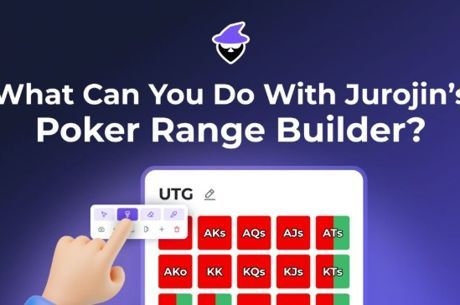“Move Up Where They Respect Your Raises”… Actually, Don’t!

Welcome. Have a seat and make yourself comfortable. Here, let me take your coat. Are you relaxed? Good. Now let me look into my crystal ball and make a few predictions about YOU as a poker player.
What’s this I see? I see you berating a bad player for calling your triple-barrel bluff with nothing but third pair — a third pair that he caught on the turn. And what is happening here? You’re bemoaning your bad luck as one of your weak opponents catches yet another flush.
Who is that you’re talking to now...? Ah, it’s your best friend in poker. You’re telling him that you’re sick of playing against weak players at the micro-stakes. You’re going to move up where they respect your raises!
For crying out loud, please don’t do that. Anything but that!
If you ever hear or read that old adage “move up where they respect your raises,” you should know to take it as tongue-in-cheek. The idea is often delivered in jest or at least with a heavy dose of sarcasm, often as a jokey response to someone having a rant about variance. Sadly, some people take this advice literally and do move up stakes in hope that “they can play some real poker” or play where “people actually know what they are doing at the table.”
But this is a very bad idea. As David Sklansky would say... do you see why?
Weak players, players new to the game, recreational players, or “fish” — whatever you want to call them — can be extremely frustrating to play against. As they have limited knowledge about poker and lack the skills to piece that limited knowledge together to form a coherent strategy, they often make bizarre plays that leave you scratching your head. Literally.
But — and it’s a massive “but” (insert Beavis and Butthead snigger) — these weak players are precisely the most profitable opponents with whom you will ever have the pleasure of sitting.
Let’s forget about the times you get lucky in a hand for now and focus on how and when you make money from poker. The most common scenario resulting in your profiting from poker occurs when your opponent makes a mistake against you. And who makes the most mistakes? Weak, inexperienced players, of course!
These lovable players make the mistake of folding the best hand. They make the mistake of calling with the worst hand. They make the mistake of chasing draws with incorrect pot odds. When they make these mistakes, you make money... at least in the “long term,” you do.
While it is frustrating and often damaging to your bankroll when you come up against these weak players who seem to be catching three-outers like they are going out of fashion, you want these players at your table because they will eventually give all of that money back and with interest.
Moving up stakes is counterintuitive for the main reason that as you do, the number of weaker players — that is players who frequently make mistakes — reduces quite dramatically. That means that while you may not suffer as many so-called bad beats, the likelihood that you’ll get eaten alive by a higher calibre of player goes up. And that feels even worse when it happens, trust me.
So how do we take on weaker players who seem to have no idea how to play poker, or at least not how to play like you want them to? Keep things simple. Poker players have a habit of overcomplicating things — “leveling themselves,” if you like — and at the lower stakes there is no need to get too tricky. This is mainly true because weak players don’t care what moves you’re pulling as they often only care about their own hand.
Here are a few tips to keep you on the straight and narrow when dealing with weaker opponents:
- Don’t bluff the weaker players. They won’t be paying enough attention to realize you’re representing a specific hand — all they’re worried about is how pretty their K♦2♦ is.
- Value bet made hands as much as you can. Weak players love to call and don’t like folding. Use this to your advantage by extracting the most value possible from your made hands.
- Believe the betting action. Weak players often play their hands as if their cards are face up. Have they check-called to the river and then suddenly bet or raised when the only straight available is made with five-deuce? They have five-deuce.
- Don’t berate the weak players. It is not your job to shout and coach the weak players because you will either (1) scare them off and they run away with your money, or (2) cause them to learn their bad play caused them to get lucky and prevent them from making the same mistake again. Both outcomes are bad for you.
Try to think of the bad beats caused by weak players as a kind of prerequisite — albeit sometimes unpleasant to endure — for helping yourself to their bankrolls, which will happen eventually if you stick to your guns and don’t try moving up stakes to “where they respect your raises.”
Truth be told, they most certainly won’t respect your raises up there. In fact, they’ll probably three-bet them.
Now here’s your coat back. Please close the door on your way out. Same time in a fortnight? Good, I’ll see you here.
Photo: “Respect” (detail), Mars Hill Church Seattle. Creative Commons Attribution ShareAlike 2.0 Generic.
Get all the latest PokerNews updates on your social media outlets. Follow us on Twitter and find us on both Facebook and Google+!









